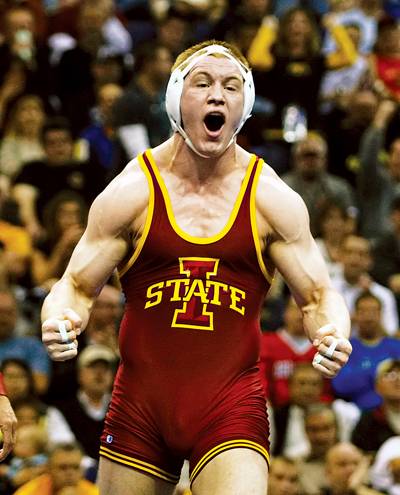Former Cyclones utilize training in Ames

Iowa State’s Jake Varner celebrates his victory over Nebraska’s Craig Brester in a championship bout in the 197-pound weight class at the NCAA Division I wrestling championships, Saturday, March 21, 2009, in St. Louis. Varner, who was runner up the past two seasons, finally wins a national championship.(AP Photo/Tom Gannam)
April 23, 2012
Jake Varner had his hand raised on Saturday night as the only former Cyclone who earned a berth to represent the United States in freestyle wrestling at the 2012 Olympics this summer.
Varner, a two-time NCAA champion and four-time NCAA finalist, was also the only former Cyclone who did not train in Ames for the 2012 Olympic Team Trials last weekend. He instead opted to train with Cael Sanderson, who coached the Cyclones from 2007-09, as part of the Nittany Lion Wrestling Club in State College, Pa.
“When it comes down to it, you have to go to the place where you think you can get the best training,” said David Zabriskie, who was Varner’s teammate as part of the 2005 recruiting class that spurred the Cyclones to four straight top-five finishes at nationals.
Zabriskie — along with Trent Paulson, Travis Paulson and Jon Reader — trained for the trials in Ames under current ISU coach Kevin Jackson as part of the Cyclone Wrestling Club upon graduating from Iowa State.
“It’s almost like we have an unfair advantage because he’s been an Olympic and two-time world champion,” Trent said of Jackson last week. “He’s already worked with several gold medalists and developed them, so he already has all the knowledge.”
Jackson, who won a gold medal at the 1992 Olympic games in Barcelona, Spain, served as the U.S. Olympic freestyle coach from 2001-08 before taking the job at Iowa State.
“He’s a mastermind,” Reader said of Jackson. “He’s been there, he’s been in every situation we face and he knows what to expect, and it’s just [up] to us to listen to him and follow the plan.”
The elder of the four wrestlers — Trent and Travis — began training non-stop after both placing third at the 2008 Olympic Team Trials in Las Vegas.
Both were three-time All-Americans at Iowa State, with Trent winning the 157-pound NCAA title in 2007. Training with each other has propelled the Paulson twins to the level of competition they are at now.
“We’ve been competitive our entire lives,” Travis said. “That’s, I think, one of the biggest reasons we’ve had success is we hold each other accountable when we push each other to our limits.
“I don’t take anything but his best. If he’s slacking, I’ll call him out and he does the same for me.”
Trent and Travis both lost in the championship rounds of the 163- and 185-pound championships last weekend after Travis opted to compete a weight above so they would not face each other en route to a possible Olympic berth.
Trent said the transition from folkstyle to freestyle wrestling was tough at first but has gotten easier the longer he has been out of college.
“It’s more explosive; it’s more throws and feet-to-back-type moves,” Trent said. “In college, you throw someone feet-to-back [and] they land on their stomach, it’s only two points. You do it in freestyle, it’s either three or five points. So there’s a little bit more incentive to [wrestle aggressively].”
Reader, who wrestled at 185 pounds in freestyle competition after wrestling three years at 165 pounds and 174 for one in college, said he prefers freestyle to folkstyle, having begun his wrestling career in it.
“You can lock your hands; you can push out — it’s more of a chess match, really,” Reader said. “There’s different strategy for both styles, but you’ve got to go out and wrestle the way you wrestle.”
For Zabriskie, the 2010 NCAA champion at heavyweight, going from heavyweight in domination-laden folkstyle to 211.5 pounds in explosive freestyle is an adjustment.
“It’s a little bit more active,” Zabriskie said. “The guys are moving a lot more, and it’s just trying to keep up with the pace. At heavyweight, I usually set the pace; here, I’m just kind of in the mix with everyone else.”
Between staying in Ames and training with his old teammate and coach closer to his hometown of Branchville, N.J., Zabriskie’s choice of the former was an easy one to make.
“Ames has been good to me,” Zabriskie said. “The Cyclone Wrestling Club has been there to support me through college and now, so it was just something that I wasn’t really ready to leave and go anyplace else for.”






